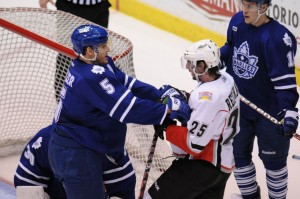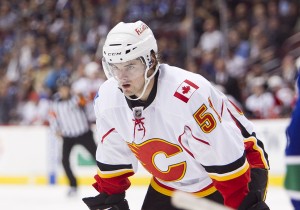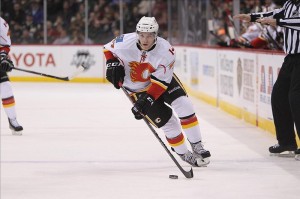
A year ago, veteran minor league coach Troy G. Ward inherited the position of head coach of the Abbotsford Heat from departing bench boss Jim Playfair. An assistant for one year with the Heat under Playfair, Ward gained a bit of familiarity with the club and its players and set right to work developing a winning strategy.
The strategy was largely successful. Despite losing a laundry list of players to the Calgary Flames due to a lot of injuries on the National Hockey League roster, Ward and his crew put together a strong 42-26-3-5 record and returned to the Calder Cup playoffs, eventually being dispatched by the Toronto Marlies in the second round.
On the eve of the 2012-13 American Hockey League season, his second as head coach and third overall with the Abbotsford Heat, Ward discusses the team’s successes, the organization’s development philosophy and his goals for the coming hockey year.
—
How would you assess how things have been going through your first couple years in the Flames organization as you prepare to begin your third season with the Heat?
I think our key players, we continue to move forward. The one thing that’s changed over time in the organization is we’re drafting differently, we have different people in charge of the draft, there’s a new general manager and a coaching change again. So as new pieces are added to the organization, things are being done a little bit differently and I think you’re seeing the growth of Abbotsford and its players in a lot of different ways. We’re kind of coming here with more of a common theme of the way management sees talent and the way it sees players and who they picked at training camp. It’s coming more clear as to which direction we’re going.
A lot of the discussion in the Flames organization regarding this year’s draft, particularly from assistant general manager John Weisbrod, revolved around the importance of character. Given your focus on developing players not just as hockey players, but as complete people, do you feel like your views mesh well with management’s?
I would say that myself, Jay [Feaster] and John [Weisbrod] as far as that component as I relate to their life in the minors and I relate to them as a development coach, that the person side of what we bring in here, the people skills and the maturity that these guys have and how they live their life, has become more of a strength and a focus in this organization than I would say it has been maybe in the not-so-far past here.
Two years ago, when you were an assistant, the Heat had a lot of injuries. Last year, the Flames had the injuries and the Heat roster was decimated instead by recalls and call-ups. Based on their on-ice performance and talking to coaches and players, the Heat players were up to the task. What kind of feedback did you receive from the Flames about how you prepared these guys for the NHL?

We’ve gotten good feedback. We’ve been able to do a really nice job of trying to get guys’ games together and put them in a position where they can go up there and be successful, whether it’s long-term or short-term. We are very diligent at trying to make sure they’re prepared. We’ve taken that a step further this year with the new [Flames coaching] staff. We’ve already had a retreat together, talked hockey, talked Xs and Os, talked about our language, how their language is, what we can do to help bridge the gap so that when these guys come up, they’re in a position to understand what Bob [Hartley] and his staff are talking about.
So, we continue to make strides and we continue to move forward in that direction, but most importantly, if you’re a Jarome [Iginla] or an Alex [Tanguay] up there, [Mike] Cammalleri, what you’d like is for these players to be (a) in great shape when they get there, so they can skate at that level, and (b) to have an air to them and a confidence that they can go up there and play, and that’s what we’re trying to recreate here on a daily basis… Last year there were a lot more [injuries] up in the Calgary organization, not so much on the Heat, and I think we did allow guys to go up there and have some success because they were in great shape and Brent [Sutter] and I were on the same page as what we wanted them to go up there and do.
Roman Horak, Lance Bouma and T.J. Brodie all spent the majority of last year with the Calgary Flames on their NHL roster. Sven Baertschi and Max Reinhart are considered to be very strong contenders for roster spots whenever the lock-out ends. How do you manage expectations for these guys in the American League for however long they’re with you?
Well, we have to make sure that they’re NHL ready whenever that lockout ends, if it does. Whatever happens up there, we just have to make sure they’re NHL ready. By that I mean it’s not so much systematically down here as it would be to develop them within their individual skill-set and how consistent they are. Meaning we still have to hold them accountable as (a) people first and (b) players second, and we have to put them in a position where everyday we’re growing their game, we’re continuing to work on things.
Lance Bouma needs to continue to develop his offensive game. Obviously he plays really hard and he’s a good checker. T.J. Brodie has to learn to simplify and keep things really simple. He has great feet, we need to work on his vision. So we’re putting this piece together down here where our main focus is that if they play again in the NHL this year for the Flames, we have to make sure they’re NHL ready. By that I mean not only physically and mentally, but we also have to grow their games while they’re here. This is a chance for them to really hone in and improve their game in some individual areas.
Leland Irving was up and down between Calgary and Abbotsford last season, and also had his first child with his wife. A lot of your players yo-yoed between the NHL and the AHL. How do you help these guys manage the mental element of this part of the game?
I think it’s like anything else. I always try to tell them, it’s still like life. You’re going to graduate from high school and go to college, but you’ve still got to come home. Every year as a college student, you always have to start your summer months at home, go away to college and then come back. I look at it the same. Maybe it sounds real easy, but for me it is real easy. Leland [Irving] started as a Heat player. Brodie and Bouma started as Heat players last year in the fall. That was home. They did come home. You have to always respect your parents and come back home and understand like, ‘this is where I got my beginnings.’
I think specific guys handle it real well in how they were coming here and how they were up and down last year, and to your point with Leland and going up and down, whether it be by way of call-up and send-down or by way of their child’s first birth and everything like that he went through last year, the fact remains that this has still been their primary home that they’ve had as far as their growth as a pro. So we look at it that way, we put it to them in that sense, and I think they’re always willing to come home and help just like we are as students. We’ll always go home and help our parents on the weekend if we can. This is a natural process of life and I think these guys understand it really well and I think they embrace it and they’re very classy about it and they’re all excited to be here and further their careers as hockey players.

Your blueline group will be a lot different this year than last. T.J. Brodie, Joe Piskula and Chris Breen are back, but you have four new faces in Zach McKelvie, Joe Callahan, Brady Lamb and Steve McCarthy. Flames fans saw Lamb at development camp – complete with his beard and aggressive style, he looked a decade older than everyone else on the ice. How are you integrating these new guys in with your established group?
We’ve moved them around quite a bit. Obviously McCarthy and Callahan come to us as AHL vets – they’ve played enough games where they’re considered vets right now – those guys are both here. McKelvie played quite a bit last year in the American Hockey League, Lamb finished the year [in the AHL]. Those are the new guys, as you mentioned, besides Piskula, Brodie and Breen. We’ve tried to switch them up partner-wise quite a bit, and the reason why is we’re trying to get them familiar with our systems and how we come together.
This is a group, though, who is a very mature group as a group of people. Your comment on Brady Lamb – full beard, looks really mature, a lot older than he really is – but also they all walk that way and they all talk that way. They’re all a very older group mentally. This is a group that we don’t see any real dynamic player in – different than maybe Clay Wilson last year – but this group is by far in years here the biggest “man” group we’ve had, where they’re all men. They’re all really physically fit, they’re put together and they’ll will play probably more with an edge than most groups.
It’s your third year in the organization and you entered the organization at the same time as a bunch of prospects turned pro and started their entry-level contracts (Greg Nemisz, Lance Bouma, T.J. Brodie, Mitch Wahl, Bryan Cameron and a few others). Can you talk a bit about their experiences in the organization and how some of them have progressed and others haven’t?
Well, that group, like you said, three years ago they seemed to be the guys leading us to the promised land and those were the kids of the future, and as we’ve progress through the future, at least the three years I’ve been around now, some of them have continued to emerge and continued to grow, some of them have slowed a little bit, some of them have been by-passed in some parts of their game. It just develops. This is a very difficult business to be in. It’s obviously a very demanding game both physically and mentally and these guys have went through the process of trying to become the best they can become. There’s always new players and there’s always somebody else down the street that might be a little bit better or might bring a different skill-set to the table.
These guys have all worked very hard. I thought they’ve all had really good camps, but as management goes through the decision-making process, everything has to come together. One thing about Jay Feaster that you really respect and honour about how well-run our organization is, everything is merit-based. And right now, the way we’ve done our training camp the last two years, those guys have all been good players in my opinion, they’ve all represented themselves well, represented their families and their parents really well, they’ve worked hard, but at the end of the day you have to make decisions that are best for the organization and that’s what Jay and John Weisbrod do. And with that comes some disappointment. Some of these guys haven’t probably been in the limelight as much as they wanted to, but the process of staying and becoming the best you can become in pro hockey is a very difficult, unrelenting task at times.
Looking around your roster, there are a lot of interesting complementary players on AHL contracts. Brett Olson was a captain in college. Barry Brust is a veteran guy. Zach McKelvie served in the armed forces. Tell me about these players and how Flames management keeps finding these quality guys to fill out the Heat’s roster.
They’ve done a great job. I’m very lucky to work with such good managers. The one thing that they have is they’re all on the same page. They all understand what they’re looking for. There’s a method to their madness, as it comes to leaders in this organization right now. They’re able to find these players because they evaluate character as such a high trait. They evaluate how they conduct themselves on a daily basis as such a high trait. And the one thing that people normally don’t overlook but for someone like yourself who looks, is winning has been a part of their DNA. They’ve won everywhere they’ve been, they understand how to win.
The Calgary Flames hired a new head coach over the summer in Bob Hartley. While you weren’t hired for that position, you were praised by Hartley and others at the press conference announcing his hiring. How do you feel about those comments, and what are your expectations for this coming season?
First of all, those comments and the things they would have said are very gratifying and you’re very appreciative when a guy like Bob Hartley says those things about you. But every day is a new day. You have to get up and get after it again and re-earn yourself every day and that’s the way I look at my job. This year down here and what we’ve done over one year as an assistant and one year as a head, we’re just going to try to take it a step further. And when I think back in this organization as a head coach versus as an assistant, it’s that the one goal we had with our minor league team, no matter where it was located in the world, was to make it a destination and so far make it into a program. Not just a team, we want to make it into a program where it’s holistic and people develop both as people and as hockey players and as teammates and they develop as family people.
We’re going to take that a step further this year. We want to continue to get better there as a staff that kind of organizes this group down here in Abbotsford, but the biggest thing we’d like to do for this organization is develop these guys a little bit further individually within their skill-set on their ice and spend a lot of time with them because we’ve spent so much time building the foundation as to how we carry ourselves and how we do and how we play our system. That’s pretty much engrained in them right now. What we’d like to do now is take it a step further as individuals and make them the best they can become.
As of now, the Heat have three goaltenders in camp (Leland Irving, Barry Brust and Danny Taylor). Have any decisions been made on which two goalies are staying with the club?
I’ll let management decide that. Whatever they give me, we’re going to coach. That’s really my philosophical approach. There are a lot of variables that go into which players stay and which players go and I pretty much let them handle that. Right now, we have three goalies as we do this interview right now and it’s Wednesday afternoon. By Friday, we could have two. I don’t know how they’ll handle that, but I have a lot of trust in Jay and John and how they’ll handle that and what they’ll do. At the end of the day, we’re a very fortunate group because we feel we have three very good goaltenders right now.